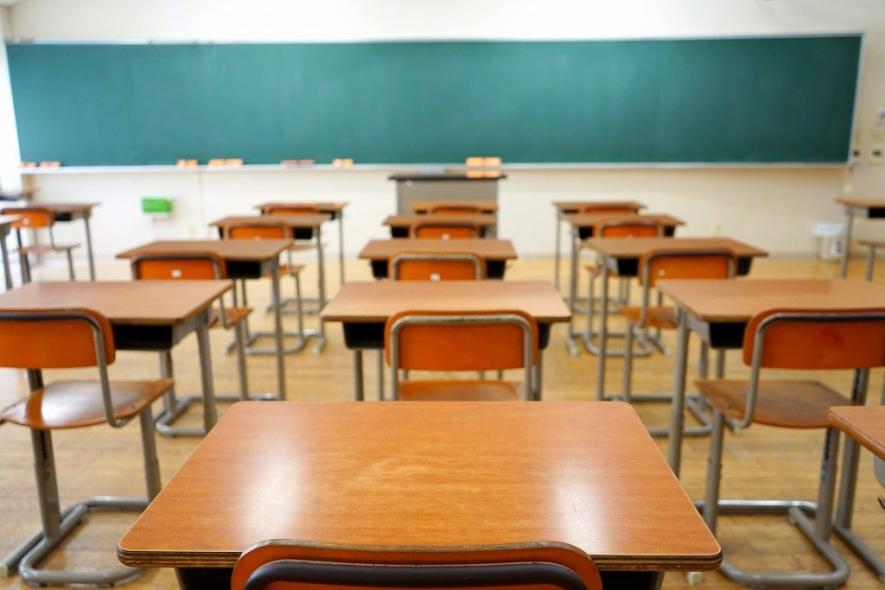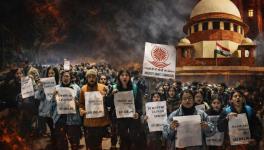Educational Institutions in the Times of COVID-19 Crisis

Education in its fundamental form is a process of socialisation. Whenever the form of society has changed, there has been talk of changes in the form of education. Today, in the times of COVID-19 crisis, policy framers are aggressively pushing for a change in the form of education through online education. In such a context, it is important to look at the changes in the structure and goals of the society which is leading to the claims of these changes in education as absolute necessities.
Is it the case that the post-Independence nationalist universal model of education based on liberty, fraternity and brotherhood has lost all its relevance today? Have the ideals of social-economic-political equality been realised? What kind of socialisation is being envisaged through online education and the New Education Policy which is being pushed along with it? Online education is not merely a 'technology', it is a new process of socialisation through which the policy and motives of the government and policy makers can be understood; and it must be seen from this perspective.
The use of technology for education while maintaining physical distancing is one thing. Anyway technological advances have always been incorporated in education from time to time and this is necessary as well. The move from blackboard to smart board was made to strengthen classroom teaching, to make it interesting. Digitalisation of libraries is a part of the same process. Recording of lectures and making them available online is also a part of the incorporation of technological advances in the teaching-learning process. These technological advances have been used from time to time to expand the process of socialisation through education. The New Education Policy and online education which is being touted today is not related in any way to this process. It is related to the model of privatisation of education, the roots of which can be traced to the Birla-Ambani Committee Report. In such a context, it is difficult to understand this without going into the historicity of the processes.
It is in itself very interesting that the tradition of framing of education policy by educationists, which had been in place since Radhakrishnan’s time, was broken by the government of Atal Bihari Vajpayee when the task of framing education policy was handed over to a committee headed by capitalists like Birla and Ambani. It is obvious that this would change the approach towards education, and this is what really happened as well. For the first time, the education sector was seen as a multibillion dollar global market. It was suggested that this field be opened up for profit. The process of privatisation in education was already in place; now the push was towards commercialisation.
Also read: Draft National Education Policy – Seductive Sophistry in Service of the RSS
There was a constant global pressure to bring education into the commercial ambit as per the World Trade Organisation- General Agreement on Trade in Services (WTO-GATS) agreements. The clear meaning of all this was end to all forms of government subsidies and grants. It is for this reason that today the UGC is being sought to be dismantled through the New Education Policy. The setting up of the UGC was based on the understanding of creating a mechanism of granting funds for development of education at the national level and that of regulation of higher education institutions. When subsidies are to stop, then the UGC can evidently be dispensed with. The manner in which an autonomous allocatory body like the Planning Commission was previously dismantled is sought to be repeated with the UGC, an autonomous body that deals with allocations in higher education.
Apart from allocation, UGC also looks after the regulation of higher education across the country. It defines the service conditions of staff, researchers and teachers of the higher educational institutions. Education was a state subject that was brought under the concurrent list during Emergency and today it is being centralised through the New Education Policy. The role of state governments in the process of policy framing has been reduced to a minimum. The centralised body which was being envisaged was to be headed by the Prime Minister but now this has been slightly modified and will be headed by the education minister. The role of educationists in this body has been reduced to mere symbolism. The role of commercial entities and political powers has undoubtedly been increased manifolds in this new structure.
Apart from policy framing, all kind of regulations and service conditions of employees is to be decided by the Board of Governor of the higher education institutions. The New Education Policy proposes autonomy for all institutions. The meaning of this autonomy is that the institutions will no longer receive any grants and the board of governors or the management of the institution will have complete autonomy. The institutions will now be run like the private businesses of these governors. These managers will now be the policy framers of education and will frame all the rules. They will decide the aims of educational institutions. Service conditions of the teachers and non-teaching staff, too, will be formulated by them. They will decide everything, from promotion to suspension. They will decide everyone’s fate. One can clearly see that the UGC, a national autonomous institution, which was formed with the objective of nation building and was given the responsibility to formulate rules and service conditions in order to advance this objective, is today being dismantled. Instead, the slogan of nationalism will usher in a company raj. A company that wants profits at all costs. It is in this context that we must understand online education. It should not be seen merely as an immediate response to the COVID-19 crisis.
The New Education Policy has changed the very definition of students and teachers. Modern India ended the medieval guru-shishya tradition of Eklavya and put in place a new definition of the teacher and student. This was related to the universal form of education. The definition of University was based on the values emanating out of the worldview based on universal knowledge. The very meaning of education was centred on nation building, based on these values. Education was to create a citizen based on the universal values of liberty, equality and fraternity. The relationship of student-teacher, too, was a part and parcel of such a perspective. In the vision of the Company Raj today, the teacher will be reduced to the role of a “facilitator” and student to that of a “consumer”. All this is being done in the garb of opposing Macaulay's education system. It is obvious that only those with money or the means to avail loans can become consumers. Only time will tell how those who see reservation as an 'attack on merit' will see all this; but it is clear that the mechanism to exclude merit present on the fringes of society has already been put in place. Preparations have been made to not merely cut Eklavya's thumb, but to kill him in the womb itself.
Also read: How Online Education Deviates from Vision of Constitution
These higher education companies will seek to minimise costs so as to maximise profits. All over the world we see that wherever such a system is in place, contract teachers are being hired instead of regular teachers and the staff is forced to work in pathetic conditions. The same model is now being brought here. Introducing technology so as to minimise costs, too, is a part of this proposal. Contract appointments in place of regular ones are gradually becoming the norm, so that the costs can be reduced manifolds. Apart from this, online content too is being pushed with this very motive. It is interesting that hefty fees are being charged from students by advertising this model. You would find this in the advertisements of all private institutions. The push towards online education, which the present government is doing by taking advantage of the COVID-19 crisis, needs to be seen from this perspective.
Online education appears as an obvious alternative for educational institutions in the wake of difficulties arising out of this ongoing pandemic. It is difficult to say for how long our educational institutions will continue to be affected by the need to enforce physical distancing, lockdown and limiting gatherings. In such a context, devising mechanisms to engage with students was and is a clear need. This could have been done only through the online medium. However, calling it an alternative to quality education will be unjust for the future of the country. We all are facing technical difficulties.
The process of linking body language/facial expressions with the arguments and using relevant examples is not really possible through the online medium. If everyone switches off their mikes then it becomes a one way exercise; while if everyone switches on their mikes, then the entire class is drowned in cacophony. There are noises from the TV in someone's house while in another house, the noises come from the kitchen. You cannot even begin to understand the situation of those girls who have no private spaces in their homes, and for whose families their education is not even a priority. How many household have the conditions to facilitate long hours of online learning with smart phones? Then this country also has Kashmir where there is no 4G connection. How can one visualise online education in those far off places where electricity and roads have not even reached so far? Is it possible to reproduce the collective atmosphere and concentration of a classroom even in those homes which do not face any of the above mentioned problems? It is completely impossible. In such a context, online education might be a necessity in the time of crisis, however, it cannot be an alternative to quality education in any way.
We are witnessing social discrimination in online education. The argument is that the underprivileged sections do not have smart phones, computers, data, etc. and hence, will remain cut off from the gains of online education. This concern is quite valid and it is an outcome of the immediate situation due to the COVID-19 crisis. If we see the difference in the required investment in online education on the one hand and classroom teaching on other, then it is clear that this very logic is being used to exclude dalits and backward sections from quality education. They are being pushed towards online education. The government is talking about providing technical facilities to the poor, dalits and underprivileged sections so that they can avail online education. This is what they are touting as affordable and quality education. The insistence on MOOCs, too, is due to this very reason.
Education institutions were built in the country after independence keeping in mind the needs of the country. The teaching of law, too, was given an emphasis along with medical and engineering education. The perspective inherent to it was the intention of developing a citizen who has liberal values like liberty, equality and fraternity, along with critical consciousness. Moral values were sought to be created through literature and social sciences. Today, this whole policy is being negated. The values of Indian-ness, sought to be inculcated in the name of attacks on 'secularism', are nothing but the values of communalism. Communalism is inimical to any form of critical consciousness. That is why this policy proclaims that only vocational education is the need of the country. Liberal universal values are being attacked by branding them as western values imparted by Macaulay's education policy. The unequal Brahminical values of Indian-ness are touted as an alternative to liberal values. This is the reason that they are pushing for 'communalism in the name of moral values' instead of liberal universal values and vocational education instead of critical consciousness building.
Nationalism which arose out of liberal universalism is being negated by 'Neo-Nationalism'. The meaning of education's role in nation building is being reduced to professional education, whose sole purpose is to create jobs. Jobs are directly related to the economy and have nothing to do with vocational education. Today, technical education is being touted as an alternative to basic sciences and skill as an alternative to education. The fundamental motive of all this is only one - reducing education to a profit making business and removing any obstacles that may come in its way.
People who have money for quality education can go to a few institutions like Ashoka and Jio, whose fees will run into lakhs. For the rest, a system of professional education is being created through privatisation and commercialisation of various institutions. It is the government's plan to create an affordable system of online education for the oppressed dalits, backwards, poor and women. After all, this was the form of education in the Indian tradition - education of scriptures for the Brahmins, education of weapons for the Kshatriyas and 'Skill India' for the rest. The Chamar's son has to remain a Chamar, a Dhobi's son can only be a Dhobi and a Luhar's son a Luhar – the transmission of skills is from one generation to another. This is the goal of Skill India as well. They will be kept away from education, so that the overwhelming majority doesn't get to inculcate critical consciousness. And we know that no consciousness of resistance can develop in this system of economic, social and political inequality.
This is the future of not only education. From agriculture to small petty trade - every sector is to meet the same fate. While on one hand they are being ravaged by big capital; on the other hand, systematic efforts are on to ensure that they are not able to organise. Labour laws are being changed. The daily hours of work are being increased, while the law guaranteeing the right to form trade union is being demolished. Students and teachers are being prevented from forming any kind of union by bringing new rules and regulations. Seventy per cent of the people have slipped below the poverty line. The rate of unemployment is continuously increasing due to the COVID-19 crisis. This crisis is a major challenge for the Indian economy which was already moving towards a slump. The buying capacity of the masses is at a low. In such a context, when the way forward should be to strengthen public health and education through increase in government spending, so that the buying capacity of people can increase and the economy can be brought back on track, the intentions of the government are diametrically opposite. It is pushing forth the capitalist policies of Birla-Ambani in the name of COVID-19. It is said a true friend is one who stands with you in times of crisis. The character of the present government, too, becomes clear in this time of crisis.
The author teaches at the University of Delhi. The views are personal.
Get the latest reports & analysis with people's perspective on Protests, movements & deep analytical videos, discussions of the current affairs in your Telegram app. Subscribe to NewsClick's Telegram channel & get Real-Time updates on stories, as they get published on our website.























